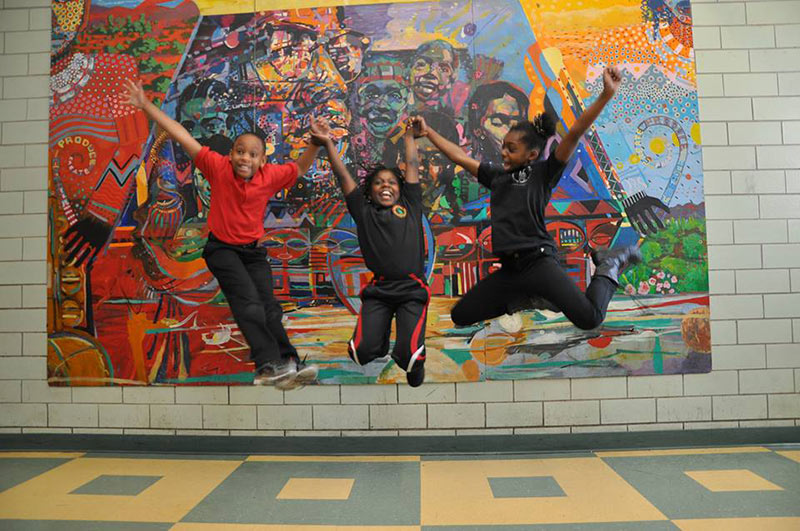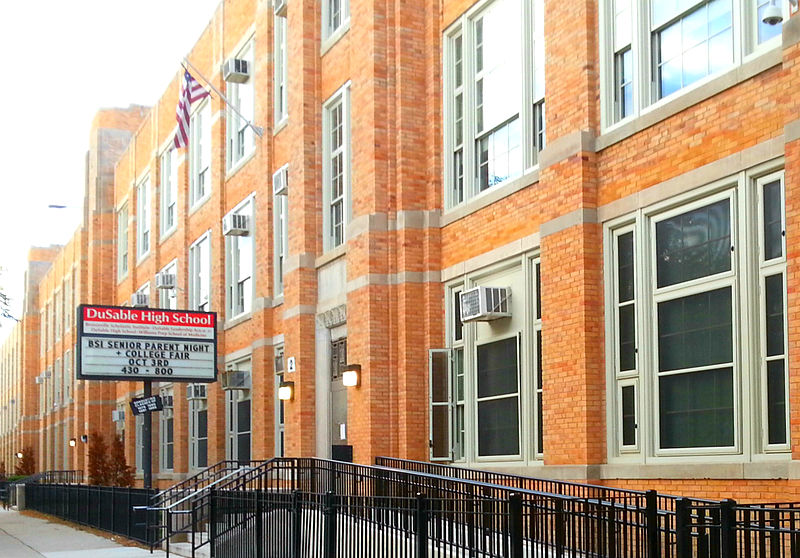Charter Schools and the Black Independent School Movement

In October 2016, the NAACP issued a formal statement advocating a national cessation of charter school expansion pending increased oversight and governance. Some Black parents were outraged at this proposal because they, along with many school reform advocates, believe that charter schools represent an avenue of escape from chronically under-resourced and failing public schools. However, many other parents and critics recognize that charter schools have a problematic history. Some of the major criticisms leveled against charter schools include their lack of standardized oversight, inconclusive academic benefits, and their tendency to disproportionately benefit middle-class families while worsening the inequality and marginalization experienced by students of color. An additional issue–and one that especially plagues African-centered charters–is the emphasis on high-stakes test results and the constant threat of closure.
Despite this controversy, charter schools represent an important juncture in the history of Black people’s continual struggle for meaningful education. Specifically, charter schools have served as one avenue for the evolution of the Black independent school movement that developed in the late 1960s and early 1970s during the Black Power and Pan-African Nationalist movements. While charters have proven to be one potentially viable option for continuing the push for African-centered education that began after the transition from Civil Rights to Black Power, they also come with significant hurdles and require compromises that some in the movement have deemed unacceptable. One particular school that illustrates this complex trajectory is Chicago’s New Concept Development Center.
The Black independent school movement came on the heels of a largely failed push for substantive integration. As it became clear that the federal and state implementation of post-Brown integration orders had little real effect on the majority of Black students who were still trapped in highly segregated, under-resourced, and academically substandard schools, community members shifted their focus to gaining control over their local schools. When this movement for community control met staunch resistance from teachers and administrators, the Black community, influenced by the era’s burgeoning emphasis on Black pride and African cultural consciousness, turned their attentions toward developing autonomous institutions.
One of these early Black Nationalist institutions was the Institute of Positive Education (IPE), founded in 1969 by a group of activist-scholars led by Black Arts poet Haki Madhubuti. Madhubuti used the profits from his Third World Press publishing house to finance the institute and its programs. The Institute is a multi-service organization committed to using African-centered principles to meet the educational needs of the local community. Rather than pushing for integration, the IPE’s primary focus was on Black consciousness-raising, empowerment, and self-determination.
Over the course of its near 47-year history, the institute has at one time or another operated a day care program, a pre-school, an elementary school, after-school programs, summer camps, a teacher training center, a parent resource library, a parent study group, and a food co-op. In 1972 the Institute established the New Concept Development Center (NCDC) as its primary school. The NCDC initially began as a Saturday school, but in 1974 it became a full-week K-3 school and eventually expanded to include grades K-8. As an African-centered school, the NCDC had a philosophy and curriculum geared toward providing a culturally relevant education that affirmed students’ identities as African people and helped students develop the self-confidence and self-determination necessary to eventually work within and on behalf of the Black community.
The NCDC also adopted a holistic approach to educating its students by emphasizing social, cultural, and physical development in addition to academic achievement. Beyond traditional academic subjects, children at the NCDC were given instruction in the Nguzo Saba1, Black History, Swahili, African and diasporic geography, African songs and dance, and nutrition. The NCDC worked toward fulfilling its mission as an independent institution for over twenty years before the school opted to convert to a publicly funded charter school.
Beginning as early as the mid-1970s, many independent Black schools were facing a host of problems that made it difficult for many of them to survive. Independent institutions faced external threats from government-sponsored sabotage as well as internal threats posed by members of the Black community suffering the effects of economic decline, unemployment, drug abuse, etc. Other sources of internal strife included ideological and political conflicts, physical burn-out, and financial collapse. These issues were further compounded by parents who began to eschew cultural development in favor of traditional education that emphasized social participation and economic competition. As a result of these issues, many independent Black schools began to fold. Those that survived often did so by adopting less radical rhetoric or by converting from independent private schools to public charters.

The popularity of charter schools grew in the 1990s and is steadily increasing, mostly due to the current emphasis on neoliberal-style school reform. From 2004 to 2014 overall charter school enrollment across the United States increased by 67%. Because neoliberal ideology is characterized by an over-reliance on market ideology and exploitative capital accumulation strategies, the proliferation of charter schools created the opportunity for the privatization of the nation’s public school infrastructure. Despite their questionable benefit, charter schools became highly attractive options for parents desperate to remove their children from chronically underperforming urban schools.
Despite their popularity, the rise of charter schools caused an intense conflict within the Black independent school movement. The proprietors of independent schools were deeply divided on the issue of the effects adopting public charters would have on their autonomy. Many of the schools established during the height of the movement maintained an African-centered focus and felt that their brand of education was a necessary counter to the Eurocentric hegemony perpetuated by the public school system. Therefore, many saw complete autonomy as the principal element of Black Nationalism’s liberatory impulse. However, others in the movement saw public school choice as a pragmatic solution for maintaining their institutions in difficult times.
As a Black Nationalist organization, the IPE was founded upon the belief that African Americans needed to build independent institutions dedicated to promoting African cultural values. However, after the IPE existed for many years on the edge of financial collapse, Carol Lee, who was one of its original founders and the wife of Haki Madhubuti, decided that since white charter schools were opened using public money, there was no reason they should not use that money to open an African-centered school that would have the means to expand and reach more children. So despite outliving most of the independent schools that developed during the height of the movement, the NCDC became the Betty Shabazz Academy (BSA) charter school in 1998. The NCDC was renamed the New Concept School and exists now only as an independent African-centered pre-school.
The BSA now serves grades K-8, maintains an enrollment of about 300 students, and was even able to expand to two additional campuses. The Barbara A. Sizemore Academy (K-8) and the DuSable Leadership Academy (9-12) both opened in the fall of 2005. The Betty Shabazz International Charter Schools (BSICS) network maintains its African-centered mission and still endeavors to provide a culturally relevant program that balances African cultural enrichment with high academic achievement. In addition to the incorporation of African history and culture into every facet of the school’s curriculum, the program at BSICS also includes rites of passage ceremonies, an international travel program, a parent council, a system of community and cultural ties, as well as entrepreneur and college preparatory programs.
However, despite the longevity of the NCDC/BSICS, its charter school conversion has come at a price. The BSICS has been a consistent victim of the pressure associated with federal standardized testing requirements. Despite maintaining a 100% college acceptance rate for four straight years, the DuSable Leadership Academy was closed in 2016 for under-performance on state standardized tests. In 2015 the Chicago Public Schools district dubiously attempted to close the Barbara A. Sizemore Academy for poor performance despite the fact that the school had successfully raised its scores above the threshold needed to remain open. The BSICS appealed the district’s decision and was allowed to remain open but under the control of the Illinois State Charter School Commission rather than the local school district.

The problems faced by the BSICS are indicative of a national trend of inconsistency in public charter school administration, and they are evidence of the compromises necessary to function as a quasi-independent public school. Overall, the independent school movement came to an irresolvable impasse on the question of where charter schools fit within the struggle for Black Nationalist liberation. While the charter system has allowed some former independent Black institutions to remain open and continue to serve their communities, it remains to be seen if the sacrifices outweigh the benefits.
- Nguzo Saba is an African-inspired communitarian value system established as part of the Kawaida philosophy created by Maulana Karenga. It consists of seven principles including umoja (unity), kujichagulia (self-determination), ujima (collective work and responsibility), ujamaa (cooperative economics), nia (purpose), kuumba (creativity), and imani (faith). ↩

I think one can see the decidedly negative impact of massive investment in charter schools in the Indianapolis Public Schools, which will soon no longer have a comprehensive high school left. The massive influx of Betsy DeVos-like, Mind Trust money has influenced school board elections, intentionally targeted the children of African American parents, and resulted in the near death of public education. If African American students were being served by the death of public education, then there might be a case to be made for the charter schools. But when the schools fail or when they get kicked out after census day, it is Black students who are victimized by the system. For more on why I choose to send my kids to a D rated public school, please see
https://www.indystar.com/story/opinion/2016/12/21/curtis-love-rated-school/95699868/